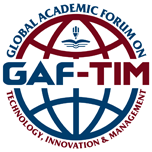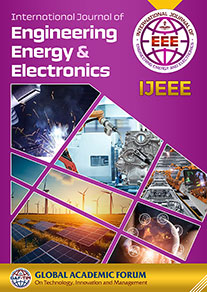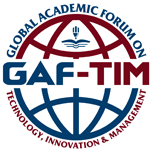Journal Policy
Peer Review Process Policy
International Journal of Engineering Energy and Electronics (IJEEE) is committed to upholding the highest standards of academic integrity and rigor in the research it publishes. To ensure the quality, relevance, and validity of the articles published, we follow a rigorous, transparent, and fair peer review process that adheres to the best practices of publication ethics. This policy outlines the various stages and expectations of the peer review process at the International Journal of Engineering Energy and Electronics (IJEEE).
- Confirming Authorship Statement: The International Journal of Engineering Energy and Electronics (IJEEE) requires all authors to confirm their authorship contribution to the submitted manuscript. Each author must provide a clear statement acknowledging their individual contributions to the research, study design, data collection, analysis, interpretation, manuscript preparation, and/or critical revision. This confirmation ensures the transparency and integrity of the authorship process, and it helps to avoid disputes and misunderstandings regarding authorship credits. Any changes to the authorship list after submission must be approved by all authors and justified in writing to the editor.
- Initial Screening: All submitted manuscripts undergo an initial screening by the editorial team to ensure they meet the journal's scope, formatting guidelines, and ethical requirements. Manuscripts that do not meet these criteria may be rejected without proceeding to peer review.
- Plagiarism Policy Statement: The International Journal of Engineering Energy and Electronics (IJEEE) does not accept paraphrased, ChatGPT content, molded or copied research paper. IJEEE is committed to upholding the highest standards of academic integrity and ethical conduct. We have a strict policy against plagiarism, which includes presenting someone else's work, ideas, or words as one's own or improperly citing sources without appropriate acknowledgment. All submitted manuscripts will undergo a thorough plagiarism check using advanced plagiarism detection software. If a manuscript is found to contain plagiarized content of more than 20%, it will be rejected immediately, and the corresponding author will be notified. In severe cases, appropriate actions may be taken against the authors, including notifying their affiliated institutions and barring them from submitting to the journal in the future. Authors are encouraged to double-check their manuscripts for proper citation and referencing to avoid inadvertent plagiarism.
- AI-Based Plagiarism Policy: IJEEE will implement proper AI-based plagiarism detection software to detect any potential plagiarism content created by AI-based software. AI-based monitoring systems will be employed continuously to ensure that the IJEEE remains free from plagiarized content even after publication. In case a manuscript is found to contain AI-based plagiarized content, IJEEE should follow a strict protocol to address the issue. This may include immediate rejection or retraction of the manuscript, notifying the author's institution, and banning the author from future submissions for a specific period.
- Selection of Reviewers: The editorial team selects at least two independent, qualified experts in the field to review each manuscript that passes the initial screening. Reviewers are chosen based on their expertise, reputation, and previous experience as peer reviewers. The journal employs a double-blind review process, in which both the authors and reviewers remain anonymous throughout the review.
- Reviewer Guidelines and Evaluation Criteria: Reviewers are provided with guidelines and evaluation criteria to assess the manuscript. These criteria include, but are not limited to:
- Originality and significance of the research
- Methodological rigor and appropriateness
- Clarity and accuracy of presentation
- Adequate and up-to-date referencing
- Ethical considerations, where applicable
- The validity of the conclusions
- Reviewers are also encouraged to provide constructive feedback and suggestions for improvement.
- Review Timeline: Reviewers are given a specified timeframe, typically 2-4 weeks, to complete their assessments and submit their reports. If a reviewer is unable to meet the deadline, they should inform the editorial team as soon as possible.
- Review Reports and Editorial Decision: Once the review reports are received, the editorial team evaluates the reviewers' feedback, comments, and recommendations. The possible editorial decisions are:
- Accept without revisions
- Accept with minor revisions
- Major revisions required (with the possibility of a second round of peer review)
- Reject
- The decision, along with anonymized reviewer reports, is communicated to the corresponding author. If revisions are required, the author(s) are given a deadline for resubmitting the revised manuscript.
- Revision and Re-Review: For manuscripts requiring revisions, the authors should address all reviewer comments and provide a point-by-point response, detailing the changes made in the manuscript. The revised manuscript may be sent back to the original reviewers or new reviewers for re-assessment, depending on the extent of the revisions and the editorial team's discretion.
- Final Decision and Acceptance: After the revision and re-review process, the editorial team makes the final decision on the manuscript. If accepted, the manuscript moves forward to the production stage for copyediting, formatting, and proofreading before publication.
- Copyright Statement: Upon acceptance of a manuscript for publication in the International Journal of Engineering Energy and Electronics (IJEEE), the authors grant the journal exclusive, worldwide, and royalty-free copyright to the published work. This includes the rights to reproduce, distribute, transmit, create derivative works, and display the published content in any form, medium, or technology now known or later developed. The authors retain the right to use their published work for personal, educational, or non-commercial purposes, provided that appropriate credit is given to the original publication in the International Journal of [Title]. By submitting a manuscript, authors warrant that the work is original, has not been published elsewhere, and is not under consideration for publication in any other journal or medium.
- Appeals and Complaints: If authors disagree with the editorial decision, they may appeal by providing a detailed explanation of their concerns and reasons for disagreement. The editorial team will carefully consider the appeal and may seek additional input from reviewers or external experts before making a final decision.
- Confidentiality: The journal maintains strict confidentiality throughout the peer review process. Reviewers are expected to treat all manuscripts and related materials as confidential and not share them with third parties without explicit permission from the editorial team.
- Reviewer Recognition and Ethical Conduct: The International Journal of Engineering Energy and Electronics (IJEEE) values the contributions of reviewers and is committed to recognizing their efforts. Reviewers are expected to adhere to the journal's ethical guidelines, including confidentiality, impartiality, and providing honest and constructive feedback. Any potential conflicts of interest should be disclosed to the editorial team.
- Post-Publication Corrections & Retraction Statement: The International Journal of Engineering Energy and Electronics (IJEEE) is committed to preserving the integrity of the scientific record. In cases where serious concerns arise regarding the validity, accuracy, or ethical conduct of a published article, the journal will undertake a thorough investigation following the guidelines set by the Committee on Publication Ethics (COPE). If the investigation concludes that a retraction is warranted, the journal will publish a retraction notice, which will clearly indicate the reasons for the retraction and provide a reference to the original article. The retraction notice will be linked to the original article, which will be marked as retracted but remain accessible in the journal's archive to maintain the scholarly record. The authors of the retracted article may be asked to provide a written explanation for the issues identified, and they may be barred from submitting to the journal in the future
- Transparency and Openness: The International Journal of Engineering Energy and Electronics (IJEEE) believes in transparency and openness in the peer review process. Authors and reviewers are encouraged to communicate openly and constructively, and the journal aims to provide clear guidelines and feedback throughout the review process. We also support initiatives that promote transparency, reproducibility, and data sharing in scientific research. Authors are encouraged to provide access to raw data, protocols, and other materials related to their research, either as supplementary materials or by providing links to public repositories.
Authorship and Contributorship Policy
The International Journal of Engineering Energy and Electronics (IJEEE) adheres to the best practices for authorship and contributorship as recommended by the Committee on Publication Ethics (COPE).
- Criteria for Authorship: To qualify for authorship, an individual must meet all of the following criteria: (a.) Substantial contributions to the conception or design of the work, or the acquisition, analysis, or interpretation of data for the work. (b.) Drafting the work or revising it critically for important intellectual content. (c.) Final approval of the version to be published. (d.) Agreement to be accountable for all aspects of the work in ensuring that questions related to the accuracy or integrity of any part of the work are appropriately investigated and resolved.
- Contributorship: Individuals who have contributed to the work but do not meet the full criteria for authorship should be acknowledged in the manuscript's Acknowledgments section. This may include those who have provided technical assistance, data collection, statistical analysis, or general support.
- Authorship Order: The order of authors listed in the manuscript should accurately reflect the relative contributions of each individual to the work. All authors must agree on the final authorship order before submitting the manuscript for publication.
- Corresponding Author: One author should be designated as the corresponding author, responsible for ensuring that all authors have approved the manuscript, its submission to the journal, and for managing all communication between the journal and the other authors. The corresponding author is also responsible for ensuring that all authors meet the criteria for authorship and contributorship.
- Changes in Authorship: Any changes in authorship, including the addition or removal of authors or changes in authorship order, must be agreed upon by all authors and communicated to the journal in writing before publication. The journal reserves the right to seek confirmation from each author's affiliated institution in cases where concerns about authorship arise.
IJEEE Privacy Statement
The International Journal of Engineering Energy and Electronics (IJEEE) is committed to maintaining the privacy and confidentiality of its readers, authors, and reviewers. We adhere to strict privacy standards to protect the personal information of our users. The IJEEE journal’s privacy policy aligns with Committee on Public Ethics (COPE) code of conduct.
As part of our commitment to data privacy, we assure our readers that their names and email addresses will not be used for any purposes other than those directly related to the journal's operations. This includes, but is not limited to, communication regarding article submissions, peer-review processes, editorial decisions, and notifications about new content and journal updates.
We will never sell, rent, or share your personal information with third parties for marketing, advertising, or any other unrelated purposes. Additionally, we have implemented appropriate security measures to safeguard your personal information from unauthorized access, disclosure, alteration, or destruction.
By using the IJEEE website and its services, you consent to the collection, use, and storage of your personal information as described in this Privacy Statement. We reserve the right to update this Privacy Statement at any time, and we encourage you to review it periodically to stay informed about how we protect your privacy.
If you have any questions or concerns about our Privacy Statement or the handling of your personal information, please do not hesitate to contact us at info@gaftim.com.
IJEEE “Creative Commons” Statement
All articles published in the International Journal of Engineering Energy and Electronics (IJEEE) are licensed under the Creative Commons Attribution 4.0 International License (CC BY 4.0). This license permits unrestricted use, distribution, and reproduction in any medium, provided that the original author and source are credited appropriately.
Under the terms of the CC BY 4.0 license, users are free to:
- Share — copy and redistribute the material in any medium or format
- Adapt — remix, transform, and build upon the material for any purpose, even commercially
Under the following terms:
- Attribution — You must give appropriate credit, provide a link to the license, and indicate if changes were made. You may do so in any reasonable manner, but not in any way that suggests the licensor endorses you or your use.
- No additional restrictions — You may not apply legal terms or technological measures that legally restrict others from doing anything the license permits.
To view a copy of the CC BY 4.0 license, visit










